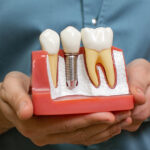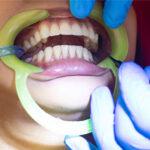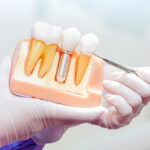Edentulism, also known as “complete tooth loss” or “complete edentulism”, refers to the condition of having no natural teeth remaining in the oral cavity. It is a severe dental health condition that can significantly impact a person’s overall quality of life.
Causes of Edentulism
There are several factors that can contribute to the development of it, including:
- Poor Dental Hygiene: Neglecting proper oral hygiene practices such as regular brushing, flossing, and dental check-ups can lead to tooth decay, gum disease, and eventual tooth loss.
- Untreated Dental Problems: Failure to address dental issues such as cavities, gum disease, or dental abscesses can eventually result in the loss of affected teeth.
- Trauma or Injury: Accidents or injuries that result in the fracture or dislodgement of teeth may require dental extraction, leading to edentulism.
- Systemic Health Conditions: Certain systemic health conditions, such as uncontrolled diabetes or autoimmune diseases, can contribute to the loss of teeth.
- Genetics: Some individuals may have a genetic predisposition to dental problems, including early tooth loss.
Treatment Options for Edentulism
Patients with edentulism have various treatment options available to restore both their oral function and aesthetics. The choice of treatment depends on several factors, including the patient’s overall health, bone density, and personal preferences. The most common treatment options include:
-
Removable Dentures
Removable dentures are one of the most cost-effective and non-invasive treatment options for this. They are custom-made prosthetic teeth that are attached to a removable acrylic or metal framework, which rests on the oral mucosa. Removable dentures offer functional and aesthetic benefits, allowing patients to chew food and maintain facial appearance. However, they may require periodic adjustments and can sometimes cause discomfort or difficulty speaking.
-
Dental Implants
Dental implants are a more permanent and natural-looking replacement option for this. They consist of titanium screws that are surgically placed into the jawbone, serving as artificial tooth roots. After a healing period, prosthetic teeth are attached to the implants. Dental implants offer superior stability, durability, and chewing function compared to dentures. However, they require a sufficient amount of healthy bone and involve a more invasive surgical procedure.
-
All-on-4 Implants
The All-on-4 dental implant technique is a specialized approach that allows for a full arch of teeth to be supported by just four implants. This method is particularly beneficial for patients with reduced bone density or those who want to minimize the number of implants required. The All-on-4 approach provides enhanced stability, improved biting force, and reduced treatment time compared to traditional individual implants.
-
Dental Bridges
Dental bridges are another treatment option for edentulism. They involve the placement of artificial teeth (pontics) that are supported by crowns attached to adjacent natural teeth. However, dental bridges require healthy neighboring teeth to serve as anchors, and the integrity of these teeth may be compromised during the bridge preparation process.
Preventing Edentulism
While there are treatment options available for edentulism, it is always better to prevent tooth loss in the first place. Here are some tips to maintain good oral health and prevent edentulism:
- Brush your teeth twice a day with fluoride toothpaste.
- Floss daily to remove plaque and food particles from between your teeth.
- Visit your dentist regularly for check-ups and professional cleanings.
- Eat a balanced diet and avoid sugary snacks and drinks.
- Quit smoking, as it can increase the risk of gum disease and tooth loss.
By following these preventive measures and seeking early dental intervention when necessary, you can significantly reduce your risk of developing it.
Although edentulism can significantly impact a person’s quality of life, there are several treatment options available to restore oral function and aesthetics. From removable dentures to dental implants, patients have choices that suit their unique needs and preferences. By maintaining good oral hygiene practices and seeking timely dental care, individuals can work towards preventing it and maintaining a healthy smile for life.




